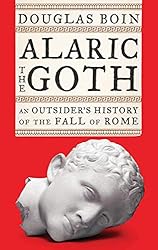Alaric the Goth: An Outsider's History of the Fall of Rome
Douglas Boin, 2020
W.W. Norton & Company
272 pp.
ISBN-13: 9780393635690
Summary
Denied citizenship by the Roman Empire, a soldier named Alaric changed history by unleashing a surprise attack on the capital city of an unjust empire.
Stigmatized and relegated to the margins of Roman society, the Goths were violent "barbarians" who destroyed "civilization," at least in the conventional story of Rome’s collapse.
But a slight shift of perspective brings their history, and ours, shockingly alive.
Alaric grew up near the river border that separated Gothic territory from Roman. He survived a border policy that separated migrant children from their parents, and he was denied benefits he likely expected from military service.
Romans were deeply conflicted over who should enjoy the privileges of citizenship. They wanted to buttress their global power, but were insecure about Roman identity; they depended on foreign goods, but scoffed at and denied foreigners their own voices and humanity.
In stark contrast to the rising bigotry, intolerance, and zealotry among Romans during Alaric’s lifetime, the Goths, as practicing Christians, valued religious pluralism and tolerance. The marginalized Goths, marked by history as frightening harbingers of destruction and of the Dark Ages, preserved virtues of the ancient world that we take for granted.
The three nights of riots Alaric and the Goths brought to the capital struck fear into the hearts of the powerful, but the riots were not without cause.
Combining vivid storytelling and historical analysis, Douglas Boin reveals the Goths’ complex and fascinating legacy in shaping our world. (From the publisher.)
Author Bio
Douglas Boin is an associate professor of history at Saint Louis University and the author of Alaric the Goth: An Outsider's History of the Fall of Rome (2020) and Coming Out Christian in the Roman World (2015), as well as two scholarly books on antiquity. He lives in Austin, Texas. (From the publisher.)
Book Reviews
[R]ichly detailed.... Boin conveys this scholarly insight to general readers in a cogent, readable text that vividly conveys the fear and confusion that surrounded the issue of immigrants’ rights in a period of declining Roman power. He draws the contemporary parallels with a freedom that teeters on the brink of overstatement, but his handling of the relocated Gothic boys’ deaths is characteristic of his bold yet scrupulous reading of ancient sources.
Boston Globe
[A] smart book for the general reader.… Alaric can never emerge as a fully three-dimensional figure, but in Boin’s hands he is lifted convincingly from the realm of brutish caricature…. [Alaric the Goth is] not a polemic. It never invokes modern times explicitly… [but] intended perhaps to be slyly allusive, [which] comes across as winks.
Atlantic
[E]ye-opening…. Taking issue with depictions of Alaric and the Goths as violent barbarians in histories…[Boin's] brisk and well-documented account reveals the Roman Empire… rife with xenophobia and political conflict.… [An] invigorating rehash of ancient times.
Publishers Weekly
[T]he parallels Boin draws to current-day [immigration] issues… are effective, but the positioning of Alaric specifically as an immigrant child torn from his parents by Rome's border policies stumbles given the amount of mights and maybes that Boin must hedge his statements with. —Kathleen McCallister, William & Mary Libs., Williamsburg, VA
Library Journal
Anyone who appreciates vividly detailed stories of the past or is morbidly curious about the dying days of a wealthy, self-important, diverse, autocratic global power should pick this up.
Booklist
A fresh look at… the Roman Empire.… Although Alaric never comes fully to life…, Boin delivers a revealing account of the late Roman empire, which was misgoverned, retreating from its frontier provinces, and almost perpetually at war…. An admirable history of a lesser-known Roman era.
Kirkus Reviews
Discussion Questions
We'll add publisher questions if and when they're available; in the meantime, use our LitLovers talking points to help start a discussion for ALARIC THE GOTH … then take off on your own:
1. What were you taught in history about the Goths, and how does Douglas Boin's account differ, perhaps even contradict, what you learned?
2. (Follow-up to Question 1) The same question can be asked about the sack of Rome in 410. What were you taught about those eventful three days, and what does Boin tell us? According to the author, the sack was not unjustified. Agree? Disagree?
3. Boin takes on a near impossible task as a historian vs. a novelist: he attempts to flesh out a real-life character about which little is actually known. How well do you think he does in putting flesh on old bones? Note that he makes ample use of "must have" and "not hard to imagine" and other conditional phrases. Do those phrases detract from the veracity of his portrait of Alaric? Or does his reasoning, even if conditional, make logical sense and help create to a vivid picture?
4. How would you describe the late Roman empire? Much has been made in book reviews and author interviews that Boin might intentionally be drawing out similarities to our own present culture. Do you see any connections?
5. What were the difficulties that Goths, including Alaric, faced as they made their way through Rome's social and military hierarchy?
6. How does Boin view the fact that Alaric turned against the Romans, who had raised and trained him. Deserting his former commrades, he fought on the side of—and led—the Goths? How do you view Alaric's decision?
7. What, according to Boin, did the Goths and other border peoples want from the Romans?
(Questions by LitLovers. Please feel free to use them, online and off, with attribution. Thanks.)


